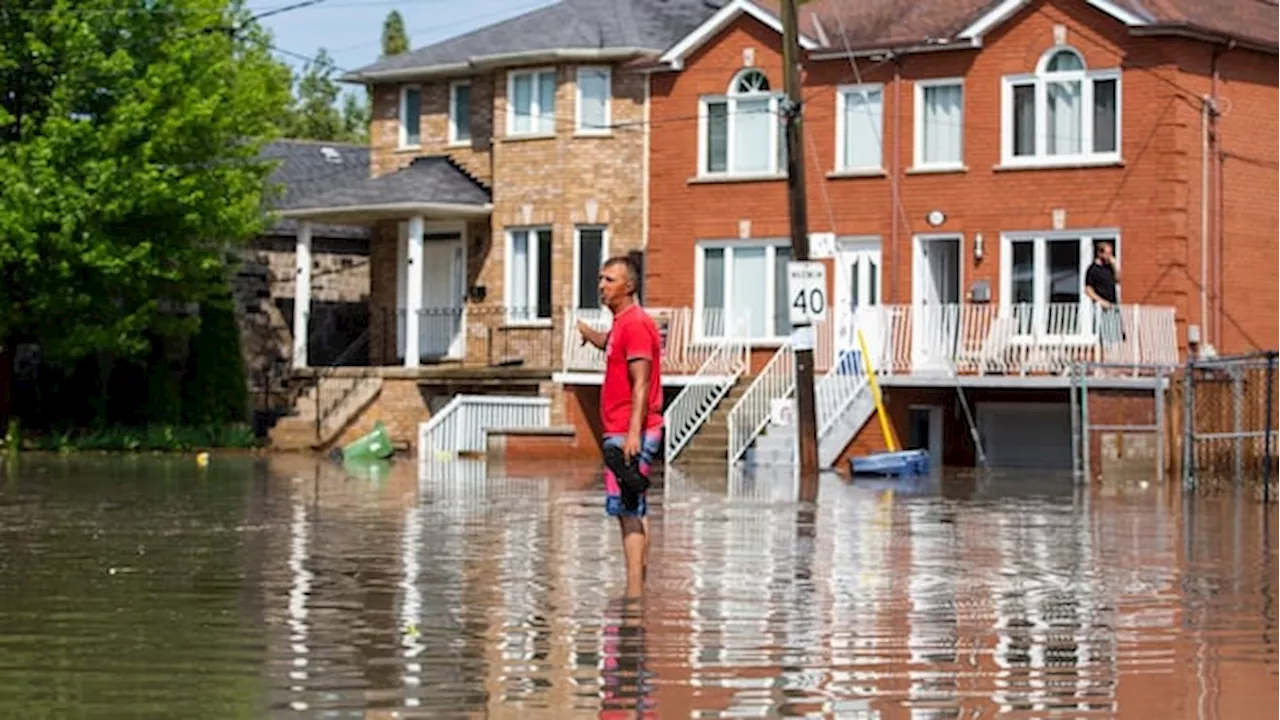A new report from the Canadian Climate Institute warns that tens of thousands of new homes built in Canada could be in areas vulnerable to floods and fires if governments don't take action. The report uses data and modeling to identify areas at risk and urges governments to create stricter regulations limiting construction in hazard-prone zones.
Canada is pushing to build more homes. Many could end up in the path of floods, fire, report warns | CBC News LoadedWith the push on to build more housing in Canada, new research is warning that tens of thousands of those homes could be built in flood- and fire-prone areas if governments don't step in.Aa severe thunderstorm caused localized flooding in Toronto in July 2020.
"They do not create regulations that stipulate or that limit the amount of construction that can occur in hazard-prone areas." With that vast picture of Canada's surface — all its ridges, hills, mountains, plains, cliffs — Fathom's scientists can simulate the flow of water and model which areas are more prone to flooding from overflowing rivers or heavy rain.a contract with the Canadian government to build a flood hazard map. Ness said this would eventually be turned into a public portal. The U.S.
Flood damages could be up to $2 billion annually in a worst-case scenario, and fire damages could be $1.1 billion — adding to potentially $3 billion in losses every year. The report only spoke of the areas in general terms — by province or region — because of the terms of their use of Fathom's and other companies' data. Ness says that provinces need to do their own analysis, which can estimate flood risk down to a much more granular level than the big-picture analysis they have done.
"How do you explain to someone that, oh, actually we got it wrong for your house because the model is uncertain, and you can't sell it now because your house prices dropped because we've said it's too risky," said Wing.
Housing CLIMATE CHANGE HOUSING CRISIS FLOOD RISK WILDFIRE RISK GOVERNMENT REGULATION
Canada Latest News, Canada Headlines
Similar News:You can also read news stories similar to this one that we have collected from other news sources.
 Canada's Housing Boom: A Privilege With ObligationsThis article argues that the recent surge in Canadian housing prices, while benefiting many homeowners, has created a significant disparity between those who own and those who rent. The author calls for greater recognition of this privilege and a willingness to contribute more to address the challenges facing Canada.
Canada's Housing Boom: A Privilege With ObligationsThis article argues that the recent surge in Canadian housing prices, while benefiting many homeowners, has created a significant disparity between those who own and those who rent. The author calls for greater recognition of this privilege and a willingness to contribute more to address the challenges facing Canada.
Read more »
 Canada's Housing Market Heats Up as Bank of Canada Cuts Interest RatesExperts weigh in on the potential impact of the Bank of Canada's latest rate cut on Canada's housing market. While some predict a surge in activity fueled by pent-up demand, others caution that trade tensions and economic uncertainty could dampen any recovery.
Canada's Housing Market Heats Up as Bank of Canada Cuts Interest RatesExperts weigh in on the potential impact of the Bank of Canada's latest rate cut on Canada's housing market. While some predict a surge in activity fueled by pent-up demand, others caution that trade tensions and economic uncertainty could dampen any recovery.
Read more »
 High Housing Costs Limit Population Mobility in CanadaCanada Mortgage and Housing Corp. (CMHC) states that soaring housing prices are hindering Canadians' ability to relocate for job opportunities, as purchasing or renting in desirable cities proves financially challenging. CMHC analysis reveals a one percent increase in housing costs in a target city corresponds to a one percent decrease in the number of people moving there. Between 1990 and 2020, the annual percentage of Canadian households relocating, including within municipalities, dropped from 17.8 percent to 10.1 percent. CMHC Deputy Chief Economist Aled ab Iorwerth attributes this trend to various factors, including aging population and technological advancements, but emphasizes the significant impact of housing affordability. He argues that high housing costs restrict both current and prospective workers, limiting skill development and hindering economic growth in major cities. The report highlights the implications for employers in expensive housing markets, who face pressure to offer higher salaries to attract skilled workers, ultimately increasing business expenses and potentially lowering productivity. CMHC suggests that Toronto, one of Canada's most expensive cities for homeownership, could experience a three percent population boost if housing starts were doubled over the next decade. Ab Iorwerth notes that while population growth is often cited as a reason for unaffordability in cities like Toronto and Vancouver, data shows that Calgary and Edmonton have remained relatively more affordable despite faster population growth in recent decades. This suggests that sufficient housing supply is crucial in managing affordability and attracting residents. The report concludes by emphasizing that population growth can be accommodated with adequate housing supply, while insufficient supply can lead to inflated housing prices, ultimately limiting city growth.
High Housing Costs Limit Population Mobility in CanadaCanada Mortgage and Housing Corp. (CMHC) states that soaring housing prices are hindering Canadians' ability to relocate for job opportunities, as purchasing or renting in desirable cities proves financially challenging. CMHC analysis reveals a one percent increase in housing costs in a target city corresponds to a one percent decrease in the number of people moving there. Between 1990 and 2020, the annual percentage of Canadian households relocating, including within municipalities, dropped from 17.8 percent to 10.1 percent. CMHC Deputy Chief Economist Aled ab Iorwerth attributes this trend to various factors, including aging population and technological advancements, but emphasizes the significant impact of housing affordability. He argues that high housing costs restrict both current and prospective workers, limiting skill development and hindering economic growth in major cities. The report highlights the implications for employers in expensive housing markets, who face pressure to offer higher salaries to attract skilled workers, ultimately increasing business expenses and potentially lowering productivity. CMHC suggests that Toronto, one of Canada's most expensive cities for homeownership, could experience a three percent population boost if housing starts were doubled over the next decade. Ab Iorwerth notes that while population growth is often cited as a reason for unaffordability in cities like Toronto and Vancouver, data shows that Calgary and Edmonton have remained relatively more affordable despite faster population growth in recent decades. This suggests that sufficient housing supply is crucial in managing affordability and attracting residents. The report concludes by emphasizing that population growth can be accommodated with adequate housing supply, while insufficient supply can lead to inflated housing prices, ultimately limiting city growth.
Read more »
 Vancouver's Housing Boom: A Solution Beyond SupplyDespite a surge in new housing construction, Vancouver continues to grapple with soaring home prices. Economists argue that simply increasing supply won't solve the affordability crisis. The focus should shift towards developing secondary cities with job opportunities and affordable housing, rather than concentrating growth solely in major metropolitan areas.
Vancouver's Housing Boom: A Solution Beyond SupplyDespite a surge in new housing construction, Vancouver continues to grapple with soaring home prices. Economists argue that simply increasing supply won't solve the affordability crisis. The focus should shift towards developing secondary cities with job opportunities and affordable housing, rather than concentrating growth solely in major metropolitan areas.
Read more »
 Federal housing minister calls on Ontario to do more for social housingFederal Housing Minister Nate Erskine-Smith is calling on the Ontario government to do more to address social housing needs in the province.
Federal housing minister calls on Ontario to do more for social housingFederal Housing Minister Nate Erskine-Smith is calling on the Ontario government to do more to address social housing needs in the province.
Read more »
 Supportive housing pause floated for Vancouver has organizations on edgeBC Housing lists 795 supportive housing units ‘underway in Vancouver as of the end of September
Supportive housing pause floated for Vancouver has organizations on edgeBC Housing lists 795 supportive housing units ‘underway in Vancouver as of the end of September
Read more »
